8 Africa
Africa is a young and hopeful continent. By 2050, it is expected to be home to a quarter of the world’s population. With abundant resources and huge potential as an economic market, strong growth is expected in the region. However, it also faces various challenges, including poverty, fragile health systems, and emerging terrorism and violent extremism.
In order to tackle these challenges, African countries pursue sustainable development in line with “Agenda 2063,”Note 21 Africa’s own development initiative. In a series of events that continue to threaten the foundation of the international community, such as Russia’s aggression against Ukraine, it becomes more important than ever for the international community to respond as a whole. Accordingly, Africa’s position in the international community has also changed significantly, and its importance and presence as a major player in the international community are increasingly growing. For this reason, it is essential to further deepen cooperation with African countries.
● Japan’s Efforts
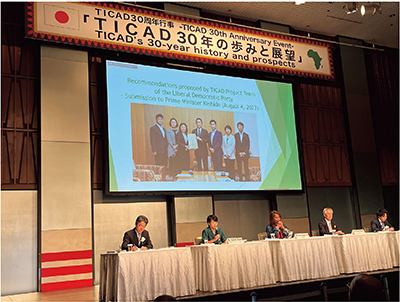
Panel Discussion 3 “Future of TICAD” at “TICAD’s 30-Year History and Prospects” held in August 2023 to commemorate the 30th anniversary
Japan has contributed to Africa’s sustainable development over many years, including through the Tokyo International Conference on African Development (TICAD).Glossary At TICAD 8, held in August 2022 in Tunisia, it made commitments to prioritizing “investment in people” and “quality of growth,” and engaging in green investment, promotion of investment, development finance, public health, human resources development, regional stabilization, and food security as well as human resources development in a wide range of fields, including industry, health, medicine, education, agriculture, justice, and administration. Since then, Japan has been making steady progress.
Japan places importance on listening directly to African “voices.” From April 29 to May 3, 2023, immediately before the G7 Hiroshima Summit, Prime Minister Kishida visited Egypt, Ghana, Kenya, and Mozambique, key countries from each region across the African continent, and heard about the various challenges each country faces. At the Summit, Japan invited Comoros, the chair of the African Union (AU), and built on the outcomes of Prime Minister Kishida’s visit to African countries to hold genuine discussions. Furthermore, from July 31 to August 3, then Foreign Minister Hayashi paid a visit to South Africa, Uganda, and Ethiopia, and exchanged views on Japan’s long-standing support and on the way forward to strengthening cooperation with each country.
On August 26, in commemoration of the 30th anniversary of the launch of TICAD, Japan organized the 30th Anniversary Event - TICAD’s 30-Year History and Prospects - in Tokyo, where participants had a lively exchange of views on past achievements and future prospects.
It has been decided that the TICAD Ministerial Meeting will be held in Tokyo in 2024, and TICAD 9 will be held in Yokohama in 2025. As “a partner growing together with Africa,” Japan strives to promote African development with people-focused approaches that are quintessentially Japanese, and to realize a resilient Africa that Africa itself aims to achieve.
■ Economy
At TICAD 8, Japan made a commitment to strengthening a free and open international economic system to achieve a better recovery from the impact of COVID-19, the situation in Ukraine, etc. on the food, energy, and other sectors, and safeguard people’s lives. It also announced its intention to support green growth in the respective countries toward achieving a resilient and sustainable Africa, and enable private and start-up companies to expand their business into Africa with a focus on vibrant and dynamic young people. Actions are taken to realize this.
Under the theme of “investment in people” in support of quality growth, Japan has long developed human resources in industries that can contribute to the promotion of the private sector. The ABE Initiative has so far provided training opportunities to more than 6,700 young Africans (see Part V, Section 1 (6) and Part V, Section 2 (2) A for the ABE Initiative). In addition to human resources in industries, Japan also helps to train ICT professionals through technical cooperation, and supports start-up companies and entrepreneurs through “Project NINJA”Note 22 (see “Stories from the Field 1” for the active role played by an ABE Initiative graduate in Rwanda, and “Master Techniques from Japan to the World” for activities in the beekeeping industry in Tanzania).
To enhance connectivity, Japan also promotes investment in “quality infrastructure,” with a focus on the three geographic areas of priority.Note 23 Moreover, as a way to improve logistics through digital transformation (DX), it undertakes infrastructure development, One Stop Border Posts (OSBP), and other initiatives, and works with the World Customs Organization (WCO) to support capacity building in the areas of border control and tariff collection.
In July 2022, Japan pledged approximately 130 million US dollars in food assistance to African countries in response to the growing food crisis caused by the soaring prices of food, fertilizer, and energy due to Russia’s prolonged aggression against Ukraine. Furthermore, in order to strengthen the region’s capacity in medium- to long-term food production, it supports efforts to double rice production, provides co-financing of approximately 300 million US dollars to the African Emergency Food Production Facility of the African Development Bank (AfDB), and helps human resources development with the target of training 200,000 people in the agricultural sector over the next three years. Japan remains committed to contributing to the enhancement of Africa’s food security, through both short-term assistance such as food aid, and medium- to long-term assistance, including capacity development for agricultural production.
■ Society
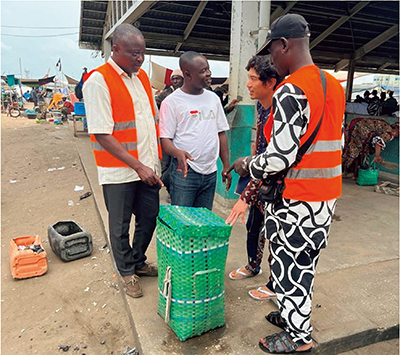
A Japan Overseas Cooperation Volunteer (JOCV) discussing the installation of trash cans with local NGO staff to improve the environment at the Cotonou fishing port in Benin, which was built with Japan’s grant aid (Photo: JICA)
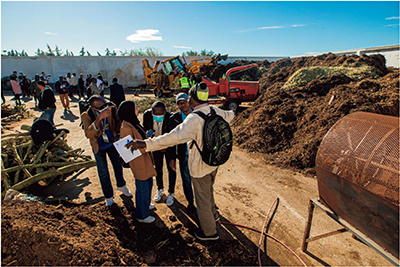
Participants from 10 African countries of the third country training on waste management and urban sanitation in Tunisia, visiting a facility where salvaged timber is composted (Photo: JICA)
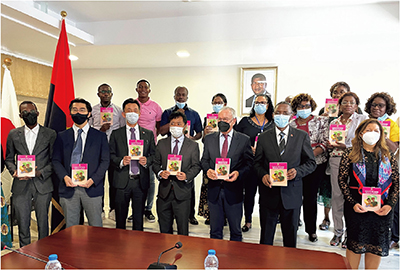
A ceremony to present maternal and child health handbooks from CFAO Motors Angola, S.A., a local subsidiary of Toyota Tsusho Corporation, under the “Project for improving maternal and child health services through the Maternal and Child Health Handbook” in Angola (Photo: JICA)
At TICAD 8, Japan expressed its commitment to correct growing disparities and to realize a quality living environment, taking into account human security, the SDGs, and “Africa’s Agenda 2063.”
The fight against infectious diseases remains a major challenge for Africa. Reflecting its own values, Japan takes comprehensive and tailor-made approaches to provide support in this field, including financial contributions to the COVAX Facility,Note 24 “Last One Mile Support,” such as the development of a cold chain system,Note 25 efforts to address vaccine hesitancy, and assistance for the manufacturing, supply, and procurement of vaccines in the region. In addition, Japan, through the United Nations Children’s Fund (UNICEF), supports seven African countriesNote 26 in developing a digital immunization information system in order to respond to public health threats, including infectious diseases. It also works with the Africa Centres for Disease Control and Prevention (CDC) and other organizations to train medical personnel as a way to strengthen field-level support to hubs for addressing infectious diseases.
Japan continues its efforts to strengthen health systems in Africa not only through bilateral assistance but also through assistance to international organizations, including its pledge of up to 1.08 billion US dollars to the Global Fund announced at TICAD 8. In addition, under the principle of “leaving no one’s health behind,” Japan contributes to achieving universal health coverage (UHC) in Africa with a focus on prevention, preparedness, and response (PPR) for future public health emergencies.
Human resources development is a key driver of economic growth. Thus, Japan strives to improve access to quality education including youth and women. At TICAD 8, Japan made a commitment to providing quality education, including STEM educationNote 27 to 9 million people, and to improve access to education for 4 million girls. Since then, Japan has helped to promote school enrollment, to enhance inclusiveness, and to provide school meals through technical cooperation and other initiatives. For example, since its launch in 2004, the “School for All” project,Note 28 which is designed to improve the learning environment for children through collaboration among schools, parents and guardians, and communities, has been rolled out to approximately 70,000 primary and junior high schools in nine countries across Africa (see “Featured Project” regarding assistance for children with disabilities in Kenya).
In Africa, there is also an urgent need to address the various challenges associated with rapid urbanization. Under the “African Clean Cities Platform” (ACCP),Note 29 Japan promotes improvements in public health through waste management. In addition, it undertakes environment-related initiatives, including measures related to climate change, such as regular forest monitoring through the JICA-JAXA Forest Early Warning System in the Tropic (JJ-FAST) (see “Master Techniques from Japan to the World” for support on waste management in Ethiopia, and “Featured Project” for efforts to increase community resilience through green works in Uganda).
■ Peace and Stability
As expressed at TICAD 8, Japan has been supporting Africa’s own efforts to achieve peace and security, prerequisites for economic growth, investment, and better lives under the “New Approach for Peace and Stability in Africa (NAPSA),”Glossary which aims to address the root causes hampering human security, and peace and stability.
It is only under the rule of law that peaceful and stable societies and sustainable growth can be realized. As specific support for Africa’s own efforts in the area of the rule of law, Japan provides training for police officers and assistance for border control. Also, it assists in developing human resources for building institutions and strengthening governance in the judicial and administrative sectors, in conducting fair and transparent elections, and in ensuring public safety. Furthermore, as part of the effort to develop mutual understanding and cooperative relations between the government and citizens as the foundation of peace and stability, Japan promotes collaboration between local government and communities.
In addition, Japan supports Africa’s own efforts in mediation and conflict prevention through strengthening the capacity of PKO personnel at Peacekeeping Training Centers in Africa and supporting the African Union (AU) and other regional organizations. Since 2008, Japan has contributed over 110 million US dollars in support of projects targeted at benefiting Peacekeeping Training Centers in 15 African countries. Also, it has dispatched more than 60 Japanese lecturers to develop the training capacity of the facilities and conduct training at the facilities. Furthermore, it decided to provide approximately 8.5 million US dollars to expand the “UN Triangular Partnership Programme (TPP),” which is a support framework for peacekeepers, to deliver training to personnel who are to be deployed to African Union-led Peace Support Operations (AUPSOs). Then, in September 2023, Prime Minister Kishida made a statement in his address at the UN General Assembly that Japan will further extend its support for peacekeepers.
In the Sahel region, by applying NAPSA, Japan contributes to regional peace and stability. In particular, focusing on the administrative vulnerabilities at the national level, it provides equipment that improves the capacity to maintain public security, training for people engaging in institution building, vocational training and education opportunities for the youth, as well as support for the development of human resources for peacekeeping operations. For example, to help stabilize the Sahel region, Japan, through the United Nations Development Programme (UNDP), implements measures to improve public services including the support for residents of the Liptako-Gourma region,Note 30 and contributes to strengthening the foundation of the community.
Since the independence of South Sudan in 2011, Japan has supported its state-building. Currently, based on the Act on Cooperation with United Nations Peacekeeping Operations and Other Operations (the International Peace Cooperation Act), Self-Defense Forces personnel are deployed to the headquarters of the United Nations Mission in the Republic of South Sudan (UNMISS) as its staff officers. Japan also assists South Sudan’s own initiatives on the peace process including through the Intergovernmental Authority on Development (IGAD), a regional organization in East Africa. Along with supporting infrastructure development, human resources development, and food assistance, Japan plays a major role in consolidating the peace and stabilizing the economy in South Sudan (see “Featured Project” regarding support in the water sector in South Sudan).
Moreover, Japan supports the organization of “National Unity Day,” a national sports event to promote the reconciliation, friendship, and unity of its citizens. Inaugurated in 2016, it has been held annually by the Ministry of Youth and Sports of South Sudan. The seventh event took place from March to April in 2023, with the participation of 336 athletes under the age of 17 who represented the whole country. Also, in July 2023, as part of the “Project for Youth Empowerment through Sports for Peace Promotion,” a total of 13 persons from the Ministry of Youth and Sports, the Ministry of General Education and Instruction, etc., were invited for training in Japan, including observing sports competitions and visits to educational institutions. Through their experiences and exchanges of opinions during their visits, the participants reaffirmed the power of sports in promoting reconciliation and human resources development. It is important that the international community continues to cooperate and support the consolidation of peace in South Sudan so that the people can feel that peace has taken root and also keep conflict from resurging in the future.
Featured Project 12
Uganda
Enhancing the Resilience of Communities with their Residents
Increasing Community Resilience through Strengthening of Road Infrastructure and Green Works in Northern Uganda
Grant Assistance for Japanese NGO Projects (March 2023 – March 2024)
In the northern part of Uganda in East Africa, a conflict that started in the 1980s and lasted for over 20 years has resulted in a significant lag in infrastructure development, and the disparity with other regions has become an issue. Furthermore, as the region hosts large numbers of refugees from neighboring countries, such as South Sudan, under Uganda’s open door policy for refugees, there are concerns about the environmental impact of refugees cutting down surrounding forests for fuel.
In response to the situation, a Japanese non-governmental organization, Community Road Empowerment (CORE), supports the revitalization of communities in the two northern districts (Gulu and Kitgum Districts) by improving residents’ livelihoods and enhancing local resilience. With the goal of “infrastructure development and environmental conservation that we can do ourselves,” CORE works to (1) carry out rural road repair activities using Do-nou (sandbag) technology, (2) restore green areas through resident-led establishment of tree nurseries and afforestation, and (3) create “energy-saving stoves” that can reduce the amount of firewood used for cooking by 70%. In addition, CORE provides environmental education to elementary school students, as well as supports female students by distributing sanitary items and giving instruction on how to sew them.
Regarding the Do-nou technology, CORE transfers the skill to 150 trainees a year, leading to the employment of young people. It also helps the locals to register themselves as groups with the local government so that they can continue their activities sustainably. In Gulu District, 560 meters of rural roads have been repaired so far. As for green works, while progress is made in resident-led seedling production, CORE aims to green 10 hectares a year through tree-planting events that involve all residents. In addition, 331 stoves have been made, and their practical use in households has begun.
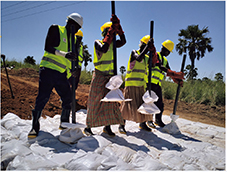
Road repair training using Do-nou technology (Photo: CORE)
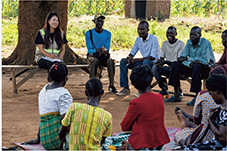
A Japanese staff discussing the continuity of future activities with trainees (Photo: CORE)
Glossary
- Tokyo International Conference on African Development (TICAD)
- An international summit-level conference on African development launched by Japan in 1993. Co-hosted with the UN, UNDP, the World Bank, and the African Union Commission (AUC), it is a forum for African development to realize the principles of African “ownership” and international “partnership.” TICAD 8 was held in Tunisia in August 2022, with the participation of 48 African countries, including 20 heads of state and government.
- New Approach for Peace and Stability in Africa (NAPSA)
- The new approach advocated by Japan at TICAD 7 held in Yokohama in August 2019, under which Japan supports African-led conflict prevention, mediation, and intervention efforts by the African Union (AU) and regional economic communities (RECs); institution building and strengthening of governance; and prevention of youth radicalization and development of resilience at the local community level, based on the principles of respecting Africa’s ownership and taking measures against root causes of conflict and terrorism. At TICAD 8 in August 2022, Japan also expressed its intention to support Africa-led efforts, under NAPSA, to achieve peace and stability, prerequisites for economic growth, investment, and better lives.
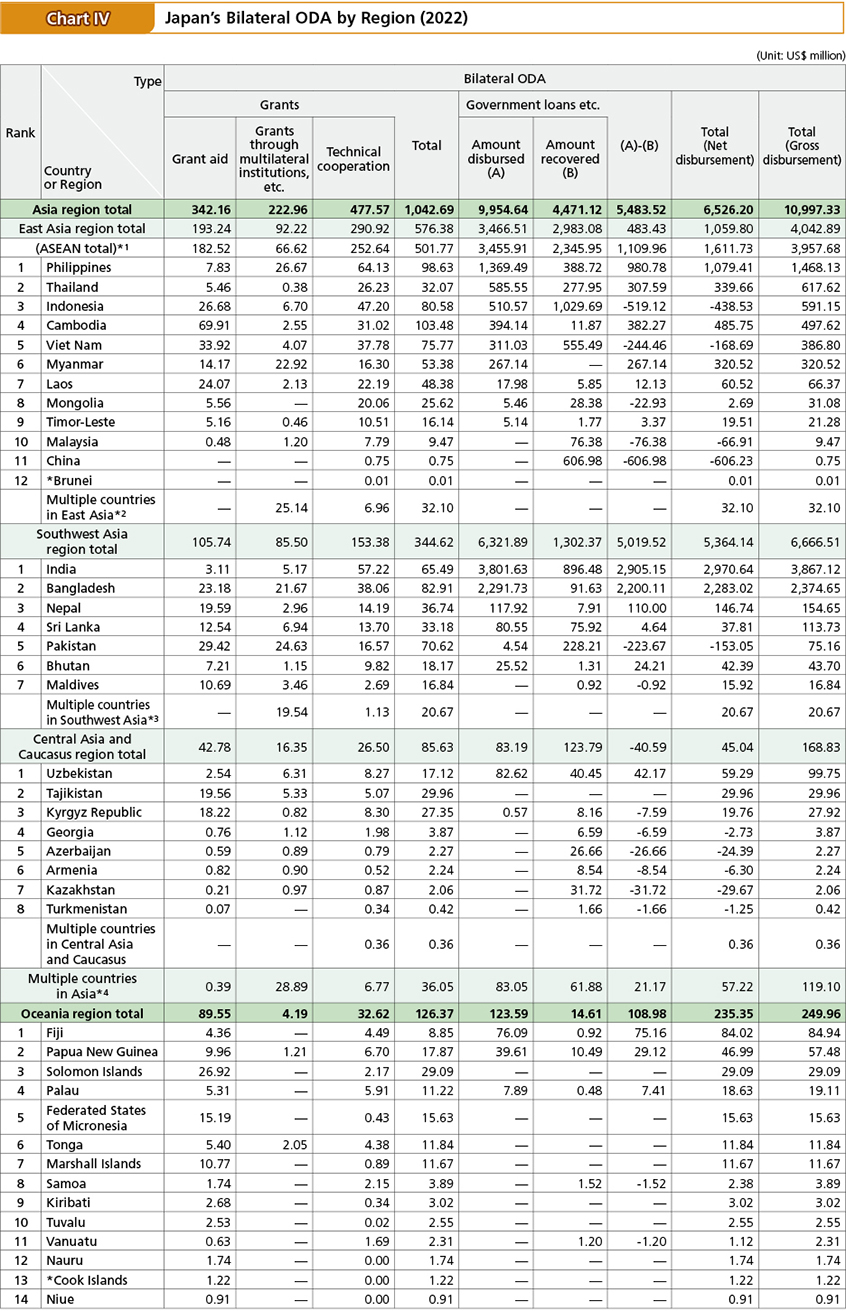
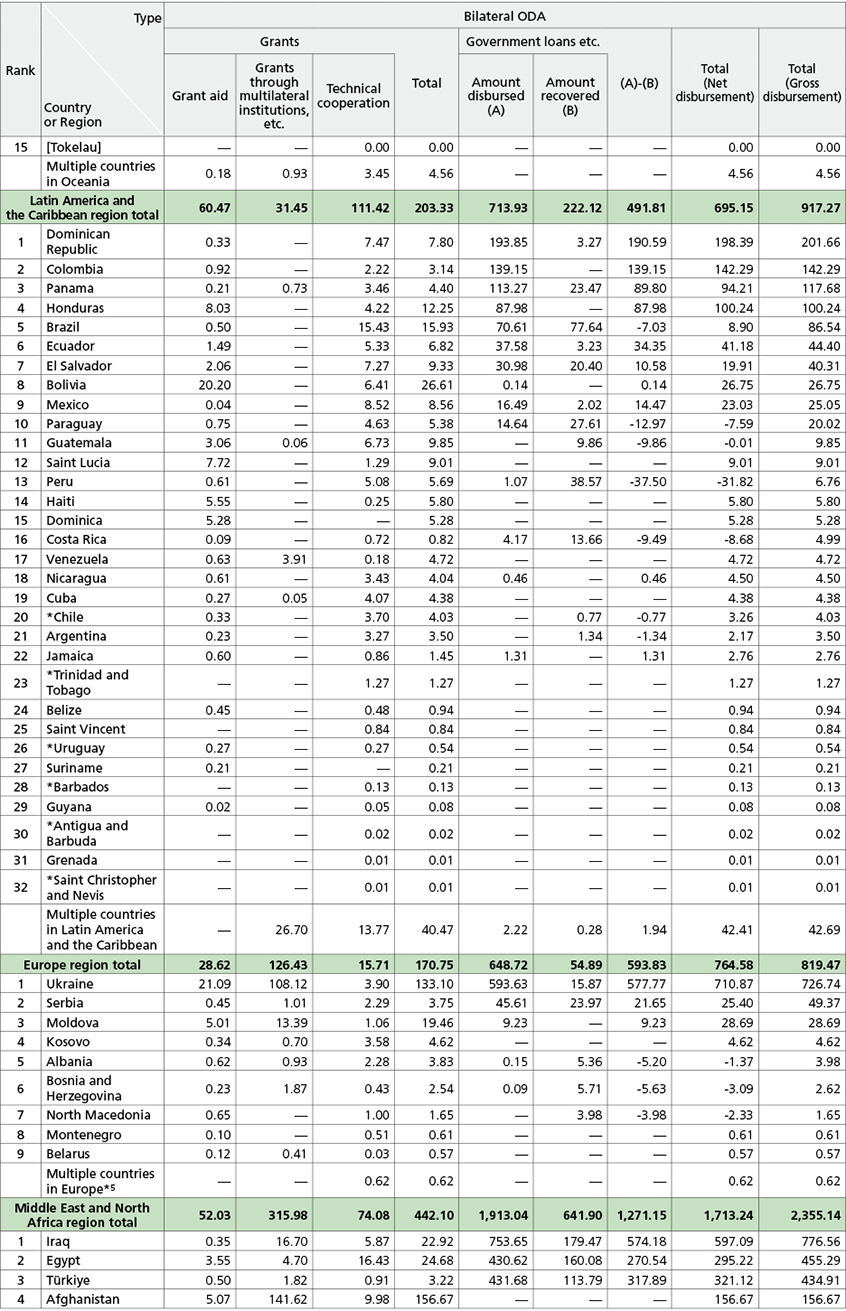
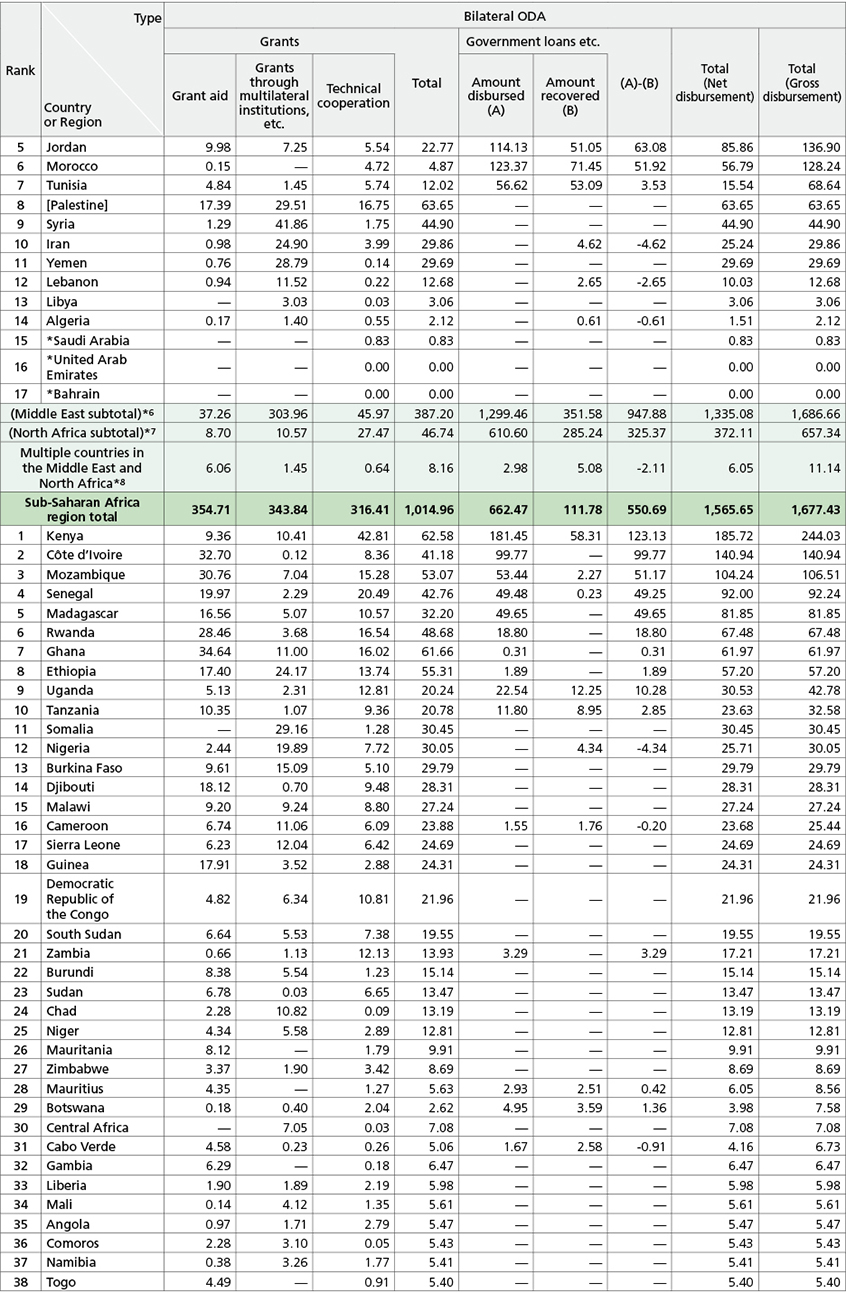
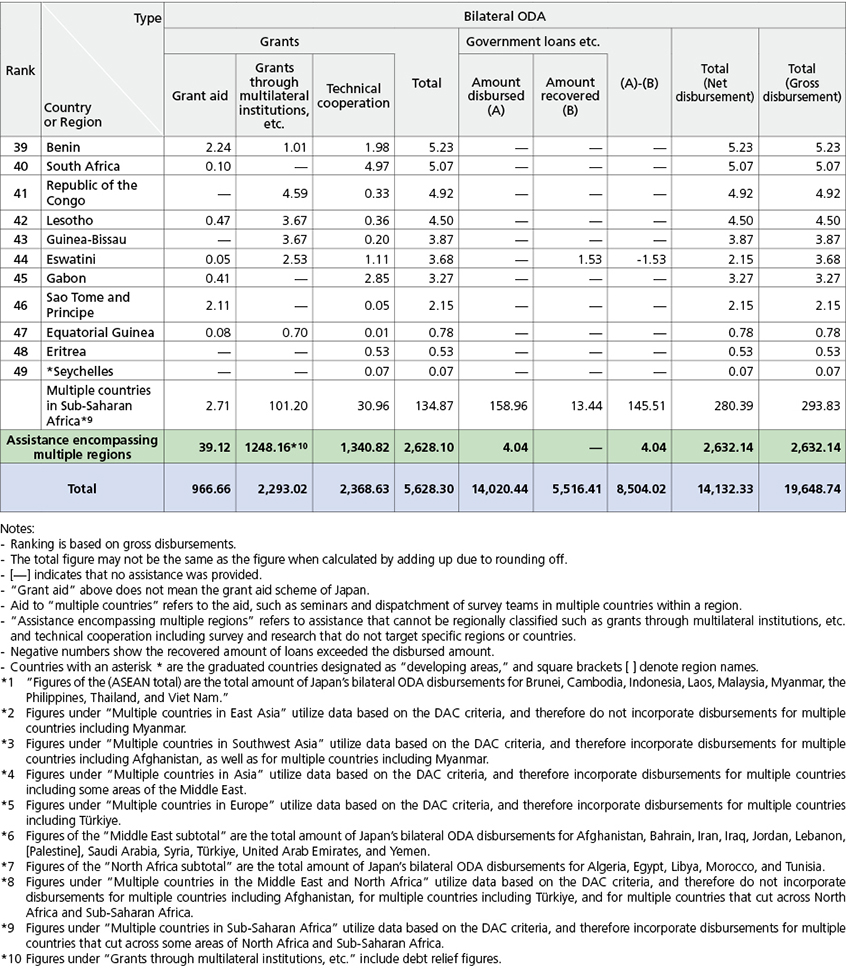
- Note 21: Adopted at the Ordinary Session of the Assembly of the African Union (AU) in 2015, the same year the “2030 Agenda for Sustainable Development” was adopted.
- Note 22: See Note 23.
- Note 23: Three areas spanning the East Africa Northern Corridor, the Nacala Corridor, and the West Africa Growth Ring.
- Note 24: See the glossary.
- Note 25: See Note 66.
- Note 26: Benin, Democratic Republic of the Congo, Republic of Congo, Malawi, South Sudan, Tunisia, and Uganda.
- Note 27: See Note 76.
- Note 28: See Note 77.
- Note 29: See the glossary.
- Note 30: A region bordering the three countries of Burkina Faso, Mali, and Niger, where terrorist attacks occur frequently.
